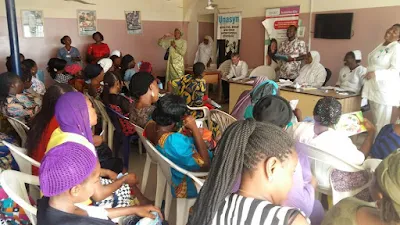 |
| A Session Of FGM Awareness Seminar |
13 percent of women – about one out of every ten – who have been
genitally mutilated (Female Genital Mutilation) in Nigeria were cut by
medical professionals, Eugene Kongnyuy, Acting Country Representative,
UN Population Fund (UNFPA), said in a recent interview.
Despite the increasing campaigns against the barbaric act, many
medical professionals have been engaging in the act, thus causing a
setback to the eradication process of the practice. This new trend is being referred to as the “Medicalization of FGM.”
Female Genital Mutilation (FGM) also known as female circumcision, is
the cutting or removal of some or all the external female genitalia, especially the areas near to the clitoris.
In respect to this harmful trend, health professionals across the
sector gathered in Abuja on Wednesday, in an advocacy meeting, on the
need to curb the ‘medicalization’ of Female Genital Mutilation (FGM) in
Nigeria.
The meeting was organised by the University of Ibadan Center for
Reproductive Health, in collaboration with UN Population Fund and
Federal Ministry of Health.
The theme for the meeting was “curbing medicalisation of FGM and sanctions for erring medical personnel in Nigeria”.
Speaking at the meeting, the minister of health, Isaac Adewole, said
the medicalisation of FGM was one of the major bottlenecks of the
achievements of the fight to end the negative traditional practice in
the country.
The minister, represented by Kayode Afolabi, director, Family Health
in the ministry, said the medicalisation of FGM is getting rampant
because people believe that once the FGM is done by a medical
professional, it is acceptable. “FGM is being hospitalized,” he said.
“The impression they are giving the people is that once it is done by a nurse, doctors, then it is acceptable.”
He said it is a big problem that needs to be tackled. He urged
stakeholders to commit time and resources to curb the art of FGM from
being medicalised.
He also challenged all partners to take the message to their various networks to enhance awareness on the issue.
Mr Kongnyuy commended the federal Ministry of Health for leading the cause in the fight to eliminate FGM in Nigeria. He said the magnitude of FGM in Nigeria is shocking because Nigeria constitutes at least 10 percent of the burden of FGM globally.
Mr Kongnyuy commended the federal Ministry of Health for leading the cause in the fight to eliminate FGM in Nigeria. He said the magnitude of FGM in Nigeria is shocking because Nigeria constitutes at least 10 percent of the burden of FGM globally.
UNICEF estimated, in 2016, that 200 million women living today in 30
countries – 27 African countries of which Nigeria is one have undergone
the procedure.
Mr Kongnyuy said out of 200 million women with FGM, Nigeria accounts
for 20 million women and 25 percent of women in Nigeria have been
genitally mutilated. Out of this, 13 percent of such cases were carried out by medical professionals.
He said talking about statistics seems to make it insignificant, but
thinking about those behind the statistics makes it very important.
“These are women who are suffering from short or long-term effects of
FGM, who are suffering the physical, physiological and sexual effects
of FGM in terms of mutilations who have haemorrhage, they have
infertility, they have infections, and they have pains, because of FGM”. He expressed shock that most of the mutilations were done by health professionals.
“Looking at statistics of those behind FGM, I was also shocked to realise that 12.7 percent of FGM is actually done by health professionals in Nigeria.
“Looking at statistics of those behind FGM, I was also shocked to realise that 12.7 percent of FGM is actually done by health professionals in Nigeria.
“That to me is unacceptable. There is no justification, there is no
medical reason and no medical benefit for FGM. We have to look at the
impact of what we are doing, that is, the short and long-term effect of
FGM on the female population,” he added.
Oladosu Ojengbede, the director, University of Ibadan Centre for Reproductive Health, outrightly condemned the practice.
He said the involvement of medical professionals has made success of eradicating the menace more challenging.
This, he said, has also encouraged the traditional practitioners to
continue in their trade, believing they are being cheated out of their
professions.
He also noted that the culture of silence is having a negative effect
on sanctioning erring medical personnel who administer FGM.
Mr Ojengbede explained that five states, Osun, Oyo, Ekiti, Imo and Ebonyi top the chat on the prevalence of FGM in Nigeria.
“This is unacceptable. Why cut at all? We need to put a surveillance
system in place at the community level and health care level.
Prosecution is also difficult as only 11 states have laws banning FGM.
The professor of Gynaecology and Obstetrics said the
non-domestication of the laws across states of the federation has made
it more difficult to sanction erring personnel.
He, therefore, advocates for multi-sectoral efforts to end FGM in
Nigeria especially in the five states with the high burden of the
problem.
Five harms of FGM
1. Can lead to excessive bleeding and death of mother during child birth .
.
2. Can cause damage to the woman’s vagina making her lack sexual sensation during sex
2. Can cause damage to the woman’s vagina making her lack sexual sensation during sex
3. High risk of contracting infections
4. Causes menstrual pain as the normal passage for blood flow could have been narrowed
5. Cervical evaluation during labour may be impeded and labour prolonged or obstructed.

















0 Comments:
Post a Comment